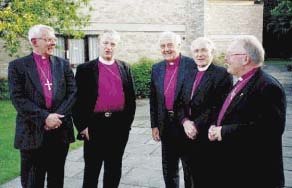|
Episcopal visitors accommodate traditionalists by David Skidmore Ten years ago the possibility of women in the episcopate was a contentious issue for the Lambeth Conference and the Anglican Communion. Since then a majority of the Communion's 37 provinces have admitted women to the priesthood, and women have been elected bishops in three provinces. Predictions by Conference planners that women's ordination would prove ``a non-issue'' this summer have proven true. Except for a brief flare-up in the press over threats by traditionalist bishops to protest at the presence of 11 women bishops, the issue of women's ordination has barely crossed the horizon.
One resolution touching on women's ordination will go before the bishops this week, but its focus is on protecting all views on women's ordination, rather than on the question whether women should be priests or bishops. Proposed by Section Three, the resolution (III.2) calls on provinces to affirm ``there will be no coercion, penalisation, or canonical disability'' toward anyone regarding their position on women in the priesthood. It further asks the Conference to declare that bishops are not obliged to ``ordain, license or institute a woman bishop.'' The second point is moot in the Episcopal Church in the United States, which mandated the acceptance and ordination of women priests in all dioceses at its 1997 General Convention. While the Church of England admitted women to the priesthood in 1992, it also provided space for dissenting bishops and parishes through the episcopal visitor act adopted by its General Synod in 1993.The act established a corps of provincial episcopal visitors, also known as ``flying bishops,'' who provide episcopal ministry to parishes which are opposed to women in the priesthood and who have no recourse to traditional-minded bishops in their dioceses or regions. According to Bishop Edwin Barnes, suffragan bishop of Richborough and the provincial episcopal visitor for the eastern half of the Province of Canterbury, this is not a temporary arrangement. ``It is an open process of reception until the churches-that means the churches internationally-are of a common mind.'''' When a vacancy occurs in a parish, the wardens and council are supposed to review the resolutions relating to the episcopal visitors' plan and determine whether they need a consultation with an episcopal visitor. ``I remind them what the Act of Synod says, that they are perfectly proper Anglicans by choosing to vote for this system.'' But choosing that system can be a challenge, Bishop Barnes noted. Not only must parishes approve the assignment by a two-thirds majority; they must also accept the status of being a renegade minority within their dioceses. Each of the four flying bishops serves an average of 60 parishes, and provides counselling and advice to any lay member or cleric who turns to them. Bishop Barnes has few complaints about the reception he has been given by the province. He notes that he is a canon of the cathedral in St Albans and celebrates a Eucharist every Thursday afternoon attended by traditionalist clergy. If female bishops
are approved by General Synod, Bishop Barnes does not anticipate a formal schism.
The Church of England, he said, has chosen ``to hold people in the Church who are
opposed and who will remain opposed as far as I can see.'' The Church in Wales also
has a ``flying bishop'' serving traditionalist parishes in that province of the Anglican
Communion. |

 However,
for some bishops the issue remains very much alive. Bishop Noel Jones (Sodor and
Man) chose to stay out of the official Conference photograph because of the presence
of female bishops. He has also stayed clear of any Bible study groups where women
bishops are present. His concern is that any discussion would be polarised and would
``muddy the waters'' of his theology. The participation of a woman bishop in the
Conference's opening service on July 18 in Canterbury Cathedral--Bishop Chilton Knudsen
(Maine, US), who led the prayers of intercession-- did not sit well with Bishop Jones
who labeled it ``tokenism at its worst.''
However,
for some bishops the issue remains very much alive. Bishop Noel Jones (Sodor and
Man) chose to stay out of the official Conference photograph because of the presence
of female bishops. He has also stayed clear of any Bible study groups where women
bishops are present. His concern is that any discussion would be polarised and would
``muddy the waters'' of his theology. The participation of a woman bishop in the
Conference's opening service on July 18 in Canterbury Cathedral--Bishop Chilton Knudsen
(Maine, US), who led the prayers of intercession-- did not sit well with Bishop Jones
who labeled it ``tokenism at its worst.''